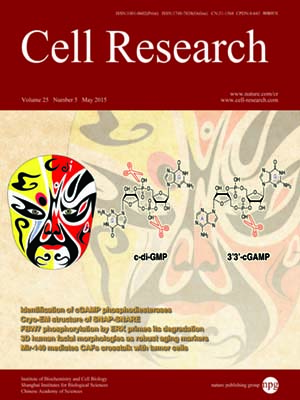
Volume 25, No 5, May 2015
ISSN: 1001-0602
EISSN: 1748-7838 2018
impact factor 17.848*
(Clarivate Analytics, 2019)
Volume 25 Issue 5, May 2015: 621-633 | Open Access
ORIGINAL ARTICLES
Deficient plastidic fatty acid synthesis triggers cell death by modulating mitochondrial reactive oxygen species
Jian Wu1,*, Yuefeng Sun1,2,*, Yannan Zhao1, Jian Zhang1, Lilan Luo1, Meng Li1, Jinlong Wang1, Hong Yu1, Guifu Liu1, Liusha Yang1, Guosheng Xiong1, Jian-Min Zhou1, Jianru Zuo1, Yonghong Wang1 and Jiayang Li1
1State Key Laboratory of Plant Genomics and National Center for Plant Gene Research (Beijing), Institute of Genetics and Developmental Biology, Chinese Academy of Sciences, Beijing 100101, China
2Current address: Department of Pathology and Cell Biology, University of South Florida, Tampa, FL 33612, USA
Correspondence: Jiayang Li(jyli@genetics.ac.cn)
Programmed cell death (PCD) is of fundamental importance to development and defense in animals and plants. In plants, a well-recognized form of PCD is hypersensitive response (HR) triggered by pathogens, which involves the generation of reactive oxygen species (ROS) and other signaling molecules. While the mitochondrion is a master regulator of PCD in animals, the chloroplast is known to regulate PCD in plants. Arabidopsis Mosaic Death 1 (MOD1), an enoyl-acyl carrier protein (ACP) reductase essential for fatty acid biosynthesis in chloroplasts, negatively regulates PCD in Arabidopsis. Here we report that PCD in mod1 results from accumulated ROS and can be suppressed by mutations in mitochondrial complex I components, and that the suppression is confirmed by pharmaceutical inhibition of the complex I-generated ROS. We further show that intact mitochondria are required for full HR and optimum disease resistance to the Pseudomonas syringae bacteria. These findings strongly indicate that the ROS generated in the electron transport chain in mitochondria plays a key role in triggering plant PCD and highlight an important role of the communication between chloroplast and mitochondrion in the control of PCD in plants.
10.1038/cr.2015.46
FULL TEXT | PDF
Browse 2883


